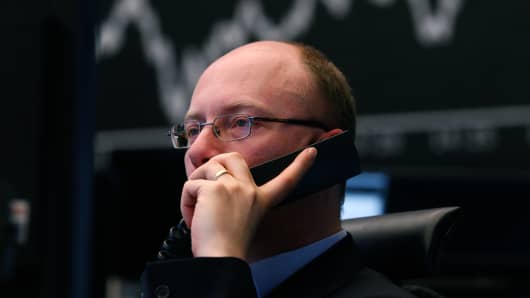Germany's Dax index has risen 20 percent over the past year, reaching new five-year highs, even as the economy has slowed in recent months, but analysts say German stocks are still attractive because of the export potential of many of the companies.
"There are well-positioned German companies – with a global footprint, and profiting from the emerging markets growth story – that are not valued as high as their global peers, because they are European," Wouter Sturkenboom, EMEA investment strategist at Russell Investments told CNBC.
"The export story is still valid, and there is a second story now: the German consumer," Sturkenboom added.
Market research company Gfk forecast an improvement in German consumer sentiment for February, with the indicator edging up to 5.8 from 5.7 in January.
But other data, released recently, has painted a much more mixed picture of the German economy. Gross domestic product (GDP) contracted 0.5 percent in the fourth quarter of 2012, yet the Dax rally has remained intact.
"The reason why the DAX is doing well, while Germany is suffering from the euro zone crisis, is because investors are positive about the upside potentials of the German companies," said John Higgins, senior markets economist at Capital Economics.
On Monday, HSBC raised Germany to overweight from neutral in their global equity recommendations.
"Germany should benefit from the upturn in global[Purchasing Managers Indices] and from a rebound in Chinese growth; it also has relatively strong earnings momentum," Garry Evans, global head of equity strategy at HSBC, wrote.
Overvalued?
But Russell Investments's Sturkenboom also sounded a word of caution on the valuation for German stocks and said they could return just single digits in 2013.
"With this 20 percent uptick, the Dax is now fair valued, rather than undervalued," he said.
Others though are more sanguine on the valuation for German equities.
"When we look at the price-earnings ratios, the 15.8 cyclically adjusted 10-year PE of Germany – as of end of December 2012 – is below both the 21.4 level of the U.S. and the German historical long-run average of 16.2," Capital Economics's Higgins said. "So there is room for increase. But it does not mean that the market does so."
According to Stan Pierson, head of European equity at Standard Life Investments, Germany also offers lots of opportunities for stock pickers.
Among Standard Life's picks are domestic-focused companies such as Kabel Deutschland, the broadband provider, Sky Deutschland,the pay TV provider, and Deutsche Telekom.
Pierson also recommended some German-based global companies that "are playing on the world stage" such as tire manufacturer Continental, chemical company BASF, industrial gas supplier Linde and software corporation SAP.
"There is a difference between country of domicile and where a company gets the profitability,"said Pierson.


